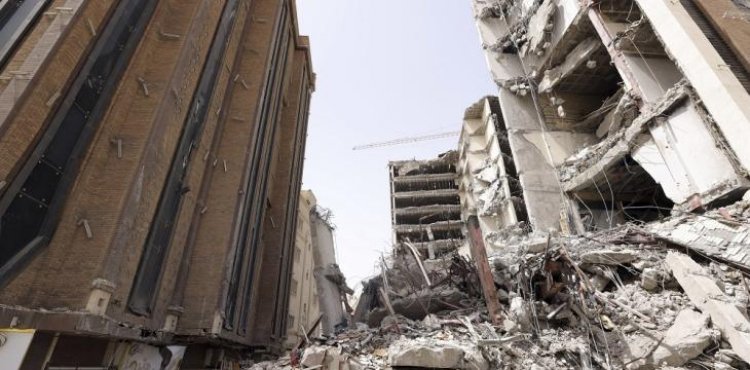The new policy only applies to new buildings, not buildings that were built many years before the regulation. Only when they need to be rehabilitated or renovated…
Experts discuss how government can address threat of building collapse
As the number of buildings collapsing in the country has been on the rise due to inadequate enforcement of regulations by regulators, real estate professionals have encouraged the government to use the hard stick against delinquent developers.
The request comes after a series of building disasters in Lagos have recently put the state in the spotlight.
With the tragedy on Gerrard Road, Ikoyi still fresh in mind, the year 2022 began with the collapse of a three-story building in the Yaba area of the state, killing at least five people.
A three-storey building in Ebute-Metta, Lagos, collapsed two months later, putting the state in the news again. At least eight people died in the rubble.
Another three-story structure collapsed in Ago, Okota, five days after the Ebute-Metta tragedy, prompting calls from experts and industry players for authoritative government bodies to take responsibility.

[Image of a collapsed building. Photo/Courtesy]
According to experts, the sad incidents that have occurred in the state in recent years could have been avoided if regulators had not fallen asleep during a growing wave of careless and unethical activities by unscrupulous developers who put monetary gain before profit. public safety.
According to Alfred Olayiwola, a real estate specialist, a lack of oversight and enforcement has fueled unethical practices in the market. He pointed to the government’s indifference to the investigation of the Ikoyi building collapse as proof enough.
Asked if the government is doing enough, he said: “No, they are not doing enough as there is not enough monitoring.” So far, there has been no effective follow-up. Even in the case of the Ikoyi event, I don’t think there was good follow-up. We have not received any information about their decisions. There are three buildings; if one of them collapses, the other two will undoubtedly be damaged.”
Barr Ekpeyong, a specialist in property law, expressed a similar position, questioning the commitment of regulatory agencies to address these issues. He noted that the politicization of the system is one of the main reasons the law enforcement wheel has turned slowly, a reality that has resulted in several deaths in recent years.
Most building approvals are politicized, and there is a lot of rule-breaking for privately privileged individuals, which inevitably contributes to this ugly trend. It is a reflection of the moral commitment of our society.
For many, visiting a construction site means nothing more than filing construction plans. They are friendly to those in positions of authority, and suddenly the severe oversight is lifted. This leads to a variety of construction catastrophes, unfortunately resulting not only in financial losses but also in human fatalities.”
He stated that the attitude of the authorities had contributed to a great extent to the delay in the implementation of the National Building Code.
“In Nigeria, almost everything is politicized. Stakeholders recognize the importance of the National Building Code, but the issues that matter most to Nigerians are not prioritized.”
Dr. Akinsola Olufemi, a construction expert and director of the Center for Applied Research and Technological Innovations at the Yaba College of Technology, said the enforcement network of regulatory authorities was not wide enough to capture the reality of today’s industry. .
He said that the two recently collapsed buildings are old buildings that had been around for some time. They have been around for quite some time. When I was Secretary General of the Nigerian Building Institute in 2005, I told them that more old buildings will collapse than new ones when I called a press conference.
The new policy only applies to new buildings, not buildings that were built many years before the regulation. Only when it is necessary to rehabilitate or renew them, the regulation will focus on them. They don’t look at structures that have been standing for 40 or 50 years.”
According to Olufemi, the conversion of buildings originally built for residential purposes, as well as the effects of the rainy season, could have disastrous consequences for certain buildings, which could eventually collapse due to stress caused by weakened foundations or by exceeding their intended live load. . .
“In Nigeria, completed buildings are not reassessed.” The rules must be followed. Structures are built to support the load for which they were designed. There is what is known as a live or imposed load (the load you bring to the building after it has been built). If it is a residential building, it should not exceed 1.5 kilonewtons per square meter. It is 2.0 kilonewtons per square meter if it is a commercial building. It is 3.0 kilonewton per square meter if it is an institutional or religious building.
Some residential buildings have become places of religious worship without regard to their weight. Apart from that, the water has an impact on the foundation. If you build a structure to support 100 kilograms of load at a point where the water is far from the foundation, the load capacity of the structure will be reduced to 60% of the original load when the water level rises (during heavy rains). ). season)
As a result, more structures collapse during the rainy season than during the dry season. “This happens because the water level rises. Yes, the regulatory bodies are doing what they can within their capabilities, but government efforts should not be limited to new construction. You also need to take into account the stock of existing structures, as there are currently more old buildings collapsing than new ones.”








